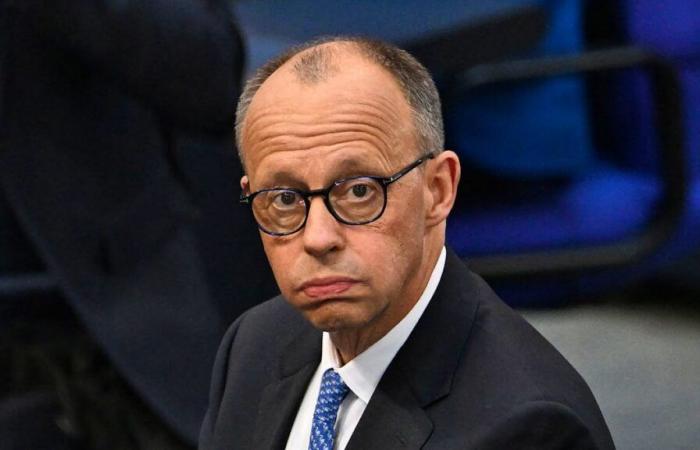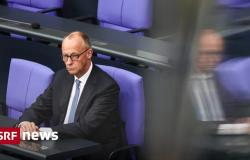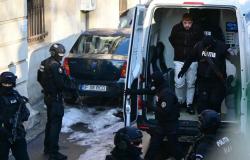Friedrich Merz seems to be a sigh of relief.
AFP
The Conservative Friedrich Merz was elected Tuesday in the German Chancellor Pain by the deputies, being forced to do it twice, signs difficulties which await him in power at a time, however a pivotal for his country.
Unprecedented scenario in Germany, it took a second ballot in the Bundestag so that the president of the Christian Democratic Party (CDU) was ultimately barely worn as head of government.
The head of state Frank-Walter Steinmeier officially appointed him Chancellor in stride.
Stupefaction au premier tour
At 69, after having hardly won the early February legislative elections at the end of February, Merz obtained 325 votes out of 630 deputies, during a second vote made necessary by a failure during the first round, which created the amazement.
While the secret designation of Friedrich Merz presented itself as a simple formality after the conclusion of a coalition agreement with the social democrats of the outgoing Chancellor Olaf Scholz, he first failed to reach the necessary threshold.
Never in the history of post-war Germany, a chancellor candidate had known such a fate. In the German parliamentary system, the deputies elected the head of government.
This setback illustrates the fragility of the Christian Democratic leader and the coalition with which he intends to govern for four years the first European economy, in a world in full geopolitical upheaval and under pressure from the Trump administration and on the inner level of an extreme booming right.
Promise
After the political crisis opened by the fall of the Scholz government in November, Friedrich Merz fueled expectations by promising to relaunch its country, in economic crisis, and Europe.
Ukrainian President Volodymyr Zelensky quickly congratulated him on Tuesday, hoping to see “more German leadership” on the old continent and in relations with the United States, “while the future of Europe is at stake”.
Same impatience in Paris, where Emmanuel Macron will receive it on Wednesday to make the Franco-German engine “stronger than ever”. The president of the European Commission Ursula von der Leyen is delighted to work with Merz for a “strong Europe”.
Contested in its own ranks
But the new leader leaves weakened. Already unusual in opinion, he is disputed in his own conservative ranks for returning to a campaign commitment: he recently softened the very strict national rules of budgetary spending.
A reversal justified by the financing needs of the vast program of rearmament of the country, faced with the Russian threat and that of American military disengagement from the European continent, and modernization of the country.
His election to the Forceps is “a camouflet” and “will necessarily have an impact on his beginnings as a chancellor and then on the upcoming government period,” said Claire Demesmay, professor at Sciences Po Paris and associate researcher at the Marc Bloch center in Berlin.
“And at the international level too, it’s really not a good sign,” she adds, while Friedrich Merz will also go to Warsaw on Wednesday.
The new Chancellor did not expect this parliamentary humiliation, as his closed face showed up, in the spans of the Assembly, after the first vote. He missed 18 votes, a sign of his inability to immediately fill up with the votes of the conservatives and the social democrats.
The extreme right in ambush
In ambient chaos, the alternative far right party for Germany (AFD) rubbed hands and immediately called for new elections.
“We are ready to assume government responsibility,” said Alice Weidel, whose movement today exceeds conservative polls, after having already obtained 20% in the legislative elections.
“You failed, the events of this day are unprecedented in this room,” said another AFD official, Bernd Baumann.
These turbulence occur while Germany is at a time of geopolitical rocking, forced to free itself from the military supervision of an American ally which has become unpredictable and to reinvent its economic model.
A supporter of unfailing support to Ukraine, Mr. Merz has promised a new “leadership” in Europe, which involves tightening links with Paris but also Warsaw.
To cope with the Russian threat, his coalition wants to continue the upgrade of the German army. But also essential infrastructure such as roads and schools, in poor condition after years of underinvestment.
On the inner level again, Friedrich Merz intends to make AFD back down by being hard on immigration.
His success in power will also depend on the agreement with the social democratic allies who have obtained key ministries: finances for vice-chancellor Lars Klingbeil and the defense where the outgoing Boris Pistorius remains.
(afp)








